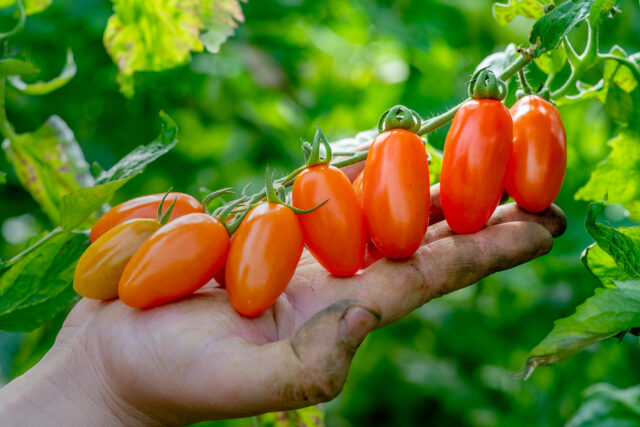
KWS Vegetables Italia
Doing fine
The Italian vegetable seed company Geneplanta has been part of KWS for a year now. The founders are enthusiastic about the modern breeding opportunities their new corporate home offers – and about its family business culture.
Giuseppe Stilo admits he was a little worried to begin with. He recalled how working at a large company had an impersonal feel and how difficult it was to share knowledge with colleagues. Just what would that be like at KWS with its thousands of employees? His own company Geneplanta only had ten.
“But when we met for the first time in 2020, I realized right away that we had identical visions about research and science in general,” says Geneplanta’s co-founder. The company was acquired by KWS in 2021 and now operates under the name KWS Vegetables Italia. “Now, after one year, I can say that everything is moving in the right direction.” Manuela Passeri and Samuele Mariani, with whom Giuseppe Stilo is sitting together in a video conference, nod in agreement.
The three Italians founded the vegetable seed company Geneplanta in 2011, confident that their new, high-performing tomato varieties would cause a stir in one big market: Mexico. “The country suggested that demand there would be high,” says Samuele Mariani. “Its various regions have different requirements as to the color, size, shelf life, yield and tolerances of tomatoes.” Some parts of the country grow them for export, for example, and others for the local population. “We had a good local network and bred the plants directly in Mexico. That opened a lot of doors for us at the time.” And it helped Geneplanta grow: Mexico was followed by expansion into Italy and Turkey.
Geneplanta fit in with KWS’ strategy of developing the Business Unit Vegetables it had newly established in 2019 by means of its own vegetable breeding activities, organic growth and suitable acquisitions. Tomatoes are one of the most important vegetable crops worldwide and are of strategic relevance to KWS alongside peppers, cucumbers, melons and watermelons.
“What we contribute is the experience in tomato breeding we’ve gathered over a decade, knowledge of the markets we operate in and, of course, the genetic material we’ve developed,” states Samuele Mariani. The initial fruits of the takeover have even been reaped in the truest sense of the word: The first KWS varieties are on sale in Mexico and Italy. |
Corporate culture
More than a number: “The team spirit at KWS is sensational,” enthuses Manuela Passeri. Her colleagues affirm that impression. Giuseppe Stilo adds that he notices every day when communicating with colleagues that KWS is a family business. “Your own work is respected, you always get friendly replies to requests, and the working environment is simply great.” Samuele Mariani is also very appreciative of the rapport among colleagues. “Everyone we work with supports each other so that we can achieve our common goals.“ |
Growth prospects
Apart from its main crop, tomatoes, Geneplanta also breeds squash and onions. Since October 2021 Manuela Passeri has also been in charge of peppers, a new addition to the portfolio. A growing team will be available to breed all varieties of vegetables: “At Geneplanta the available personnel had to multitask. Now there will be more staff, which means we can work in a more organized way where everyone focuses on one thing,” says a delighted Samuele Mariani. In the first year alone, the number of colleagues in vegetable breeding in Italy has almost doubled from 10 to 17. |
Stations and locations
Geneplanta has its roots near Parma – the Emilia Romagna region in Northern Italy is free of pathogens and boasts good soils. However, Geneplanta’s agricultural areas there, as well as those at its second Italian location in Corridonia (Marche Region), were only leased from year to year. Backed by the large company KWS, it now has long-term agreements and thus greater security to plan ahead – and a larger area than previously. KWS has already purchased ten hectares of land in Mexico, too, and also intends to set up a further breeding station in the interior of the country. “Being part of KWS means we can now organize two cycles in Mexico,” says Samuele Mariani. In the future, each country where KWS breeds vegetables is to have its own stations. |
This article is from insideKWS, the employee magazine of KWS. If you are an employee of our company, you have access to all other articles and previous issues.
© KWS SAAT SE & Co. KGaA 2025